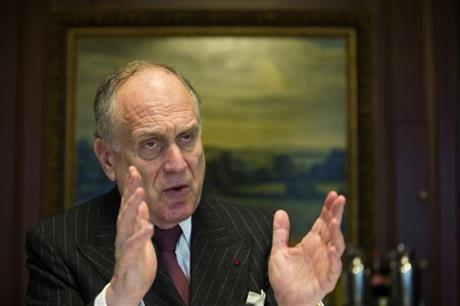
By KIRSTEN GRIESHABER
The president of the World Jewish Congress Ronald Lauder anwers to questions during an interview with The Associated Press at a hotel in Berlin, Thursday, Jan. 30, 2014. Lauder says Germany must make a stronger effort to identify and return thousands of looted art pieces the Nazis took from the Jews. He told The Associated Press on Thursday that Nazi-looted art still hangs in German museums, government offices and private collections. Lauder says the country’s legislation needs to be changed in order to facilitate its return. (AP Photo/Markus Schreiber)
Ronald Lauder
The president of the World Jewish Congress Ronald Lauder listens to questions during an interview with The Associated Press at a hotel in Berlin, Thursday, Jan. 30, 2014. Lauder says Germany must make a stronger effort to identify and return thousands of looted art pieces the Nazis took from the Jews. He told The Associated Press on Thursday that Nazi-looted art still hangs in German museums, government offices and private collections. Lauder says the country’s legislation needs to be changed in order to facilitate its return. (AP Photo/Markus Schreiber)
Ronald Lauder
The president of the World Jewish Congress Ronald Lauder poses in a hotel room prior to an interview with The Associated Press in Berlin, Thursday, Jan. 30, 2014. Lauder says Germany must make a stronger effort to identify and return thousands of looted art pieces the Nazis took from the Jews. He told The Associated Press on Thursday that Nazi-looted art still hangs in German museums, government offices and private collections. Lauder says the country’s legislation needs to be changed in order to facilitate its return. (AP Photo/Markus Schreiber)
Ronald Lauder
The president of the World Jewish Congress Ronald Lauder poses in a hotel room prior to an interview with The Associated Press in Berlin, Thursday, Jan. 30, 2014. Lauder says Germany must make a stronger effort to identify and return thousands of looted art pieces the Nazis took from the Jews. He told The Associated Press on Thursday that Nazi-looted art still hangs in German museums, government offices and private collections. Lauder says the country’s legislation needs to be changed in order to facilitate its return. (AP Photo/Markus Schreiber)
Ronald Lauder
The president of the World Jewish Congress Ronald Lauder listens to questions during an interview with The Associated Press at a hotel in Berlin, Thursday, Jan. 30, 2014. Lauder says Germany must make a stronger effort to identify and return thousands of looted art pieces the Nazis took from the Jews. He told The Associated Press on Thursday that Nazi-looted art still hangs in German museums, government offices and private collections. Lauder says the country’s legislation needs to be changed in order to facilitate its return. (AP Photo/Markus Schreiber)
Prev 1 of 5 Next
BERLIN (AP) — Germany must make a stronger effort to identify and return thousands of looted art pieces the Nazis took from Jews, the president of the World Jewish Congress said Thursday as he met with top government officials in Berlin to push his case.
Ronald Lauder told The Associated Press that Nazi-looted art still hangs in German museums, government offices and private collections. He said the country’s legislation needs to be changed in order to facilitate its return.
The art pieces stolen from the Jews “are the last prisoners of World War II,” Lauder said. “They should be returned to the victims of the Holocaust and their heirs.”
The topic became the focus of attention in Germany and abroad after the 2012 discovery of more than 1,400 artworks in the Munich apartment of Cornelius Gurlitt, the son of a Nazi-era art dealer.
Some of the paintings, drawings and prints are claimed by the heirs of former owners persecuted by the Nazis. The affair prompted fresh scrutiny of how Germany handles disputes over Nazi-looted art.
Lauder, who was to hold closed-door meetings with Germany’s justice and foreign ministers to push for new solutions, called on Germany to eliminate its 30-year statute of limitations on stolen property cases, a major stumbling block in many restitution cases since World War II ended almost 70 years ago.
He also called for the establishment of an international commission that would research and help return the artworks to families of the original owners. Such a body “should have real power, so that museums that have avoided transparency up until now, will be required to do the research under its auspices in accordance with international standards,” he said.
Already on Wednesday, Monica Gruetters, the government’s top cultural affairs official, said Germany wants to double state funding for the hunt for Nazi-looted art, which since 2008 has amounted to €14.5 million ($19.7 million).
Gruetters told lawmakers it was “unbearable that there is still Nazi-looted art in German museums.”
She pledged to create a central point of contact for claimants to avoid the impression that German officials were trying to duck responsibility.
The German government also in 2003 created a commission can be called on if the ownership of a piece of art stolen or sold during the Nazi period is disputed. While the Limbach Commission’s recommendations are non-binding, they are almost always adopted. The government also installed a task force to look into the origins of the paintings and drawings recently found in Gurlitt’s Munich apartment.



